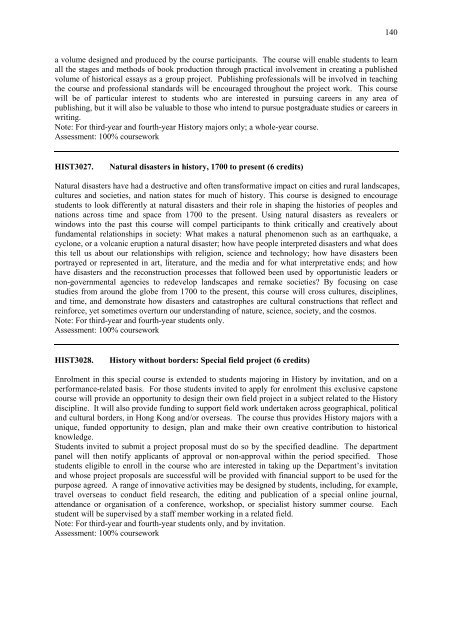(BA) (4-year-programme) - The University of Hong Kong
(BA) (4-year-programme) - The University of Hong Kong
(BA) (4-year-programme) - The University of Hong Kong
You also want an ePaper? Increase the reach of your titles
YUMPU automatically turns print PDFs into web optimized ePapers that Google loves.
140a volume designed and produced by the course participants. <strong>The</strong> course will enable students to learnall the stages and methods <strong>of</strong> book production through practical involvement in creating a publishedvolume <strong>of</strong> historical essays as a group project. Publishing pr<strong>of</strong>essionals will be involved in teachingthe course and pr<strong>of</strong>essional standards will be encouraged throughout the project work. This coursewill be <strong>of</strong> particular interest to students who are interested in pursuing careers in any area <strong>of</strong>publishing, but it will also be valuable to those who intend to pursue postgraduate studies or careers inwriting.Note: For third-<strong>year</strong> and fourth-<strong>year</strong> History majors only; a whole-<strong>year</strong> course.Assessment: 100% courseworkHIST3027.Natural disasters in history, 1700 to present (6 credits)Natural disasters have had a destructive and <strong>of</strong>ten transformative impact on cities and rural landscapes,cultures and societies, and nation states for much <strong>of</strong> history. This course is designed to encouragestudents to look differently at natural disasters and their role in shaping the histories <strong>of</strong> peoples andnations across time and space from 1700 to the present. Using natural disasters as revealers orwindows into the past this course will compel participants to think critically and creatively aboutfundamental relationships in society: What makes a natural phenomenon such as an earthquake, acyclone, or a volcanic eruption a natural disaster; how have people interpreted disasters and what doesthis tell us about our relationships with religion, science and technology; how have disasters beenportrayed or represented in art, literature, and the media and for what interpretative ends; and howhave disasters and the reconstruction processes that followed been used by opportunistic leaders ornon-governmental agencies to redevelop landscapes and remake societies? By focusing on casestudies from around the globe from 1700 to the present, this course will cross cultures, disciplines,and time, and demonstrate how disasters and catastrophes are cultural constructions that reflect andreinforce, yet sometimes overturn our understanding <strong>of</strong> nature, science, society, and the cosmos.Note: For third-<strong>year</strong> and fourth-<strong>year</strong> students only.Assessment: 100% courseworkHIST3028.History without borders: Special field project (6 credits)Enrolment in this special course is extended to students majoring in History by invitation, and on aperformance-related basis. For those students invited to apply for enrolment this exclusive capstonecourse will provide an opportunity to design their own field project in a subject related to the Historydiscipline. It will also provide funding to support field work undertaken across geographical, politicaland cultural borders, in <strong>Hong</strong> <strong>Kong</strong> and/or overseas. <strong>The</strong> course thus provides History majors with aunique, funded opportunity to design, plan and make their own creative contribution to historicalknowledge.Students invited to submit a project proposal must do so by the specified deadline. <strong>The</strong> departmentpanel will then notify applicants <strong>of</strong> approval or non-approval within the period specified. Thosestudents eligible to enroll in the course who are interested in taking up the Department’s invitationand whose project proposals are successful will be provided with financial support to be used for thepurpose agreed. A range <strong>of</strong> innovative activities may be designed by students, including, for example,travel overseas to conduct field research, the editing and publication <strong>of</strong> a special online journal,attendance or organisation <strong>of</strong> a conference, workshop, or specialist history summer course. Eachstudent will be supervised by a staff member working in a related field.Note: For third-<strong>year</strong> and fourth-<strong>year</strong> students only, and by invitation.Assessment: 100% coursework
















